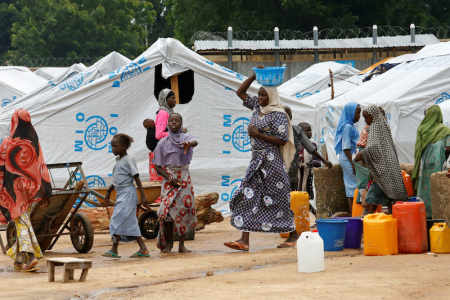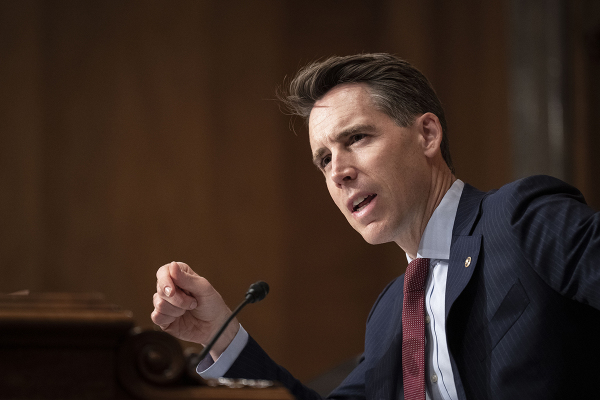At least 81 killed in Boko Haram attack in Nigeria; civilians shot, bodies run over

Authorities in the Borno state of Nigeria said Wednesday that at least 81 people were killed in an attack on a nomadic community believed to have been carried out by militants aligned with the Islamic extremist groups Boko Haram or Islamic State West Africa Province.
The Borno government in northeast Nigeria released a statement Wednesday explaining that residents described how militants in armored tanks and trucks attacked the Faduma Kolomdi community in the Gubio local government area on Tuesday morning.
Along with killing dozens in the community, it's believed that the militants also abducted seven individuals, including the head of the village, and women and children.
A video posted on social media shows dead bodies scattered out across a dirt field.
These are not Animals, they are human being kills by Boko Haram insurgents in the village of Gubio local gov't of Borno state.
— Abubakar Sadiq Kurbe (@iamKurbe) June 10, 2020
President @MBuhari, you were voted to protect the lives and properties of the electorates, these people need your attention, they too are human. pic.twitter.com/AngROLEIyh
The incident reportedly lasted hours. Borno State Gov. Babagana Umara Zulum traveled to the community on Wednesday in the wake of the attack.
According to the government's statement, a male witness told the governor that the armed men came to the village at around 10 a.m. on Tuesday.
“They gathered us and said they wanted to deliver religious sermon to us,” the unnamed resident was quoted as saying in the statement. “They asked us to submit whatever arm we had. Some villagers gave up their dane guns, bow and arrows.”
The survivor said the militants then began shooting “at will.”
“Even children and women were not spared, many were shot at close range,” the man said. “Many started running.”
Five people were evacuated to a hospital for treatment, according to the state.
“We have buried 49 corpses here while another 32 corpses were taken away by families from the villages around us,” the resident said. “The insurgents abducted seven persons including our village head. They went away with 400 cattle.”
A resident of a nearby village also verified what the survivor told Zulum, the government said.
Zulum described the attack as “barbaric and unfortunate.” He also noted that around the same number of individuals were killed in an attack last year in Gajiram.
“The only solution to end this massacre is by dislodging the insurgents in the shores of Lake Chad,” the governor said. “Doing so will require collaborative regional efforts.”
The Nigerian government has faced criticism over its inability to thwart attacks on civilians carried out by Islamic extremist groups, including Boko Haram and its offshoot, Islamic State West Africa Province.
While the Borno government’s statement placed blame on Boko Haram militants, other reports have implicated militants aligned with ISWAP. No group has yet claimed responsibility for the attack.
Since its insurgency began over a decade ago, Boko Haram has killed and abducted thousands and displaced millions from their homes. The group has killed Muslims and Christians.
In 2016, Boko Haram pledged allegiance to the Islamic State but splintered soon after amid disagreements over leadership.
According to the government, the militants did not set the Gubio village on fire as often happens during their attacks. There are also fears that the death toll could be higher than 81.
"The bodies were strewn over a large area as the insurgents pursued their victims, shooting them and crushing them with their vehicles," Ibrahim Liman, a member of a government-backed anti-jihadist militia, told AFP on Wednesday. He said the death toll was around 69.
Gubio resident Modu Ajimi told The Washington Post that he lost four cousins in Tuesday's attack. He found their dead bodies in the dirt field.
“Their bodies bore a bullet hole in almost every part,” Ajimi said.
The coronavirus pandemic has not stopped Boko Haram or ISWAP from carrying out attacks against villages in both Borno and Adamawa in recent months.
The Nigerian government has also faced criticism from international activists for failing to thwart attacks in Middle Belt states where thousands have been displaced.
“The most essential responsibility of any government is the protection of its own citizens,” U.S. Commission on International Religious Freedom Commissioner Johnnie Moore, an evangelical human rights advocate, wrote in a tweet. “Nigeria’s government keeps failing at this. It is time for the U.S., U.K., [European Union] and others to evaluate every single area of cooperation until the Nigerian’s fix this.”
According to The Washington Post, ISWAP has continued to stage attacks on Army bases and is collecting taxes from residents in villages where it's attempting to take control.
The International Crisis Group reported last year that ISWAP’s approach to law and order is “extraordinarily harsh and violent.”
“It metes out the full range of punishments it believes the Quran to mandate, including cutting off the hands of alleged thieves and killing adulterers, though some units are reportedly more lenient than others,” a May 2019 report states. “It meets perceived threats to its fiscal base (fishing without authorization, failure to pay requisite taxes) and security (using mobile phones in areas where they are forbidden, which is interpreted as spying) with brutal beatings, sometimes even executions.”
Nigeria is listed on the U.S. State Department's watch list of countries that engage in or tolerate severe violations of religious freedom. Advocates in the U.S. are calling for the appointment of a special envoy to assess the human rights crises in Nigeria.
“In Nigeria, ISIS and Boko Haram continue to attack Muslims and Christians alike,” Secretary of State Mike Pompeo said Wednesday. “ISIS beheaded 10 Christians in that country just this past December.”
Follow Samuel Smith on Twitter: @IamSamSmith
or Facebook: SamuelSmithCP





















